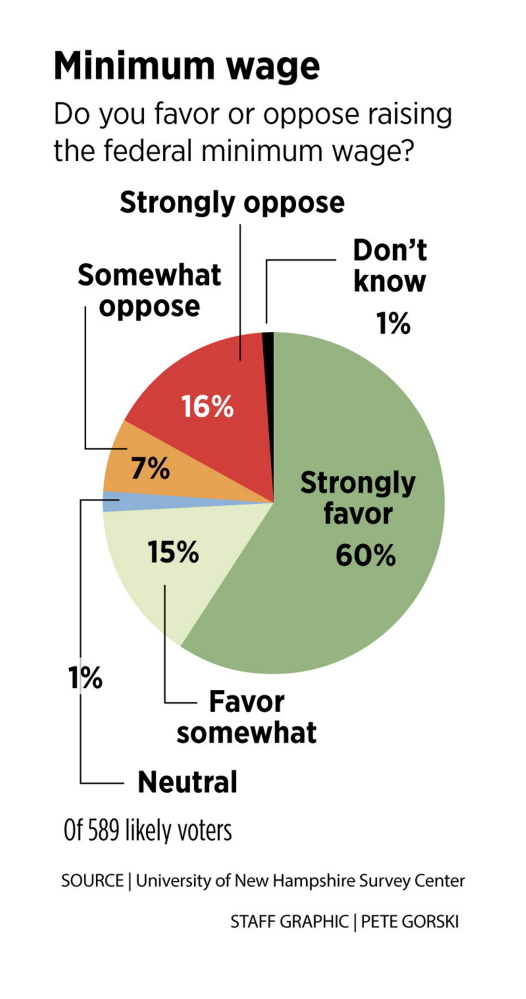Raising the minimum wage enjoys broad support across the political spectrum in Maine, according to a new poll commissioned by the Portland Press Herald/Maine Sunday Telegram.
The poll, conducted by the University of New Hampshire’s Survey Center from Sept. 19-25, found that 75 percent of the 589 people surveyed by a live interviewer supported raising the federal minimum wage, with 60 percent expressing strong support. The poll has a margin of error of 4 percentage points.
Ninety-three percent of Democrats and 70 percent of independents supported the wage increase, compared with 59 percent of Republicans.
Support in Maine for raising the minimum wage is consistent with voter sentiment nationwide, but efforts to do so have faced political opposition.
Democrats have made increasing the minimum wage a central issue over the past year. President Obama signed an executive order setting a minimum wage of $10.10 an hour for federal contractors. He has called on Congress to do the same for all U.S. workers, but lawmakers have refused to do so.
In Maine, Republican Gov. Paul LePage vetoed a bill to raise the state minimum wage, while U.S. Rep. Mike Michaud, the Democratic nominee for governor, has been advocating for an increase at both the federal and state levels. Independent gubernatorial candidate Eliot Cutler said in August that he believes the minimum wage should be increased at the federal level. The federal minimum is $7.25 per hour, and Maine’s minimum is $7.50.
The city of Portland, meanwhile, is considering a plan to increase the minimum to $9.50 an hour.
Raising the minimum wage could motivate the Democratic base to turn out at the polls in November, but it probably won’t become a wedge issue to divide Republicans, said Andrew Smith, director of the UNH survey center.
“Most people (earn more than) the minimum wage, so it doesn’t impact them personally,” Smith said. “So it’s nice to raise the minimum wage, but most voters are not going to make this a central issue in their voting decisions.”
The Press Herald/Telegram contacted several people who took part in the survey. One survey question was: “Do you favor or oppose an increase in the federal minimum wage?”
Trenton resident George Hopkins said he supports raising the minimum wage, but the 85-year-old Republican is still supporting LePage.
Hopkins, a retired painting contractor who now drives a taxicab to supplement his Social Security, says he always tried to pay the employees of his painting business a fair, livable wage.
“My father kept telling me I was paying my men too much,” Hopkins said. “But I felt I was making pretty good money and I felt they’d like to get ahead just like I do, so I paid them more than I should have probably. But I had a good, loyal crew.”
Fellow Republican Mike Bartlett disagrees. The 70-year-old Wiscasset resident, who makes $160,000 to $250,000 a year as a consultant for banks and companies seeking government contracts, said calls to raise the minimum wage were “silly” and a “gimmick.”
“The reason I think policymakers are interested in raising minimum wages is because they want to make it appear they’re helping people on the lower end of the spectrum,” Bartlett said.
He said the minimum wage is intended for entry-level workers who are learning basic skills, and those who are trying to live off it have not taken advantage of educational opportunities society offers. He suggested that older minimum-wage workers were probably people who made poor life choices, such as high school dropouts, criminals and people who had children as teenagers.
“You’ve got to let the market figure these things out,” said Bartlett, who acknowledged that the marketplace can be cruel “if there is an excess of labor.”
However, Rachel Leichliter, a 30-year-old married mother of three children, doesn’t believe the free market would lead to higher wages. Although the minimum wage is intended for entry-level workers, many parents and seniors work low-wage jobs because they have to, said the self-employed Connor Township woman, who is not enrolled in a political party.
Opponents also argue that increasing the minimum wage to keep up with rising costs of living will only increase inflation, resulting in less consumption and a loss of jobs. But there have been no studies to support that claim, said Democrat Earl Redwine, 74.
“They’ve been using that argument every time there’s a suggested increase in the minimum wage,” said Redwine, a retired nonprofit administrator and carpenter from St. David. “It just doesn’t happen. It’s just a scare tactic of the opposition.”
Redwine recalled a time in his life when he earned the minimum wage and it was increased, saying “it was like the hand of God came down and lifted us up.”
Independent voter Jen Pringle, a 44-year-old registered nurse from Cape Elizabeth who earns about $55,000 a year, said increasing the minimum wage is one way to reduce the number of people who need public assistance, or welfare.
“If you don’t pay someone a livable wage, they require more assistance, like MaineCare and food stamps,” Pringle said.
Copy the Story LinkSend questions/comments to the editors.




Success. Please wait for the page to reload. If the page does not reload within 5 seconds, please refresh the page.
Enter your email and password to access comments.
Hi, to comment on stories you must . This profile is in addition to your subscription and website login.
Already have a commenting profile? .
Invalid username/password.
Please check your email to confirm and complete your registration.
Only subscribers are eligible to post comments. Please subscribe or login first for digital access. Here’s why.
Use the form below to reset your password. When you've submitted your account email, we will send an email with a reset code.